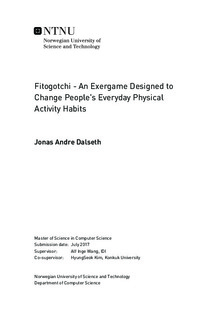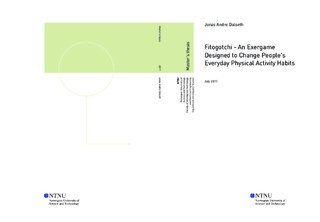| dc.description.abstract | As people in the modern society adopt increasingly sedentary lifestyles, health problems like obesity, cardiovascular diseases, bone and joint diseases and some types of cancer, became more widespread then before. In addition to reducing people's life quality, these diseases put great expenses on the society. It is, therefore, of great interest to find ways to increase people's physical activity levels. This work on expanding the field of exergames aims to contribute to this goal.
This study has explored existing exergames, technologies that can track players' physical movements, theory on how to design an enjoyable game and the health benefits gained by performing physical exercise. Different game genres were also studied and reasoned about in order to determine in what ways these genres could be used in exergames. The knowledge gained from this review was used to design a game that aims to increase the players' everyday physical activity level.
This game was then tested on a total of 43 people in Norway and South Korea, in order to determine how players enjoyed playing the game and to what extent players were motivated by the game to increase their activity level. These metrics were measured in the beginning and end of a two week long test period. Furthermore, the study investigates to what extent the game affected what kind of physical activity the players performed and whether potentially new habits were maintained after the test period was over.
The results from the experiments indicate that participants enjoyed playing the game, and that a reasonable amount of players were motivated by the game to increase their physical activity level, though to various extents. The study also showed a decrease in these two metrics over time. The game also had an impact on the type of physical activity the players performed, but it failed to motivate them to do types of physical activities they disliked. Furthermore, the results indicate that some players might have maintained a higher activity level after they stopped playing the game, but further research are needed to confirm these results. | |

